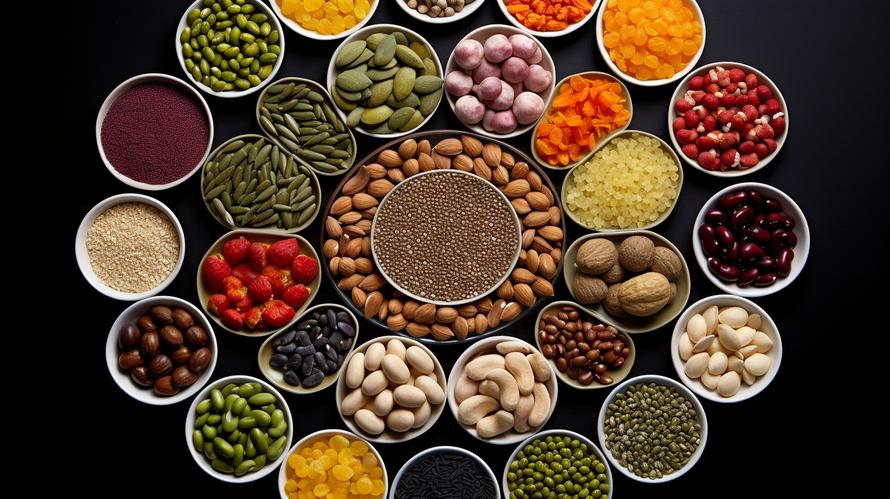Nestled deep within the lush, verdant rainforests of South America, discovered by ancient civilizations and cultivated for thousands of years, there thrives a magical little seed brimming with unimaginable potential. It doesn’t look like much, wrapped in its unpretentious shell, but don’t be fooled. This tiny wonder is chia, a powerhouse plant that holds remarkable secrets for health and wellness, inclusive of proven benefits for cholesterol management.
Isn’t it peculiar how sometimes profound solutions to significant problems come in the most inconspicuous packages? Chia seeds, these minuscule nuggets of nature, pack a hearty punch of nutrients and have substantial research backing their cholesterol-lowering abilities.
But how can such a small seed have such a big impact on something as vital and complex as our cholesterol levels? Let’s embark on a rhetorical journey that takes us from the ancient civilizations who first recognized the benefits of chia seeds, through the modern science that explains their power, and landing at easy-to-follow tips on integrating these potent seeds into your daily diet.
Unraveling the tale of the tiny chia seed takes us back to its native soils of Central and South America. Dubbed “running food” by the Aztecs and Mayans, chia seeds were consumed by warriors and runners for sustained energy. What the ancients understood intuitively, modern science is now substantiating – the vast nutritional benefits conferred by these tiny seeds.
Science tells us that chia seeds are exceptional sources of fiber, with a whopping 10 grams per two tablespoons. They are rich in omega-3 fatty acids, a type of fat your body can’t produce and thus must acquire from your diet. These qualities lay the groundwork for the cholesterol-lowering effects of chia seeds. How exactly? Let’s dive into the biochemical know-how.
Think of your body as a finely tuned machine, with cholesterol performing various essential functions such as building cell walls and producing hormones. The trouble arises when bad cholesterol (LDL) outweighs the good cholesterol (HDL). Too much LDL cholesterol generates sticky plaques that build up in blood vessels, making it harder for blood to flow through the arteries, thereby increasing the risk of heart disease.
Now, fiber, specifically soluble fiber, is an absolute game-changer when it comes to lowering LDL cholesterol levels. It forms a gel-like substance in your digestive tract that literally ‘traps’ cholesterol and ferries it out of your body before it can be absorbed. And guess what is extraordinarily rich in soluble fiber? Yep, chia seeds.
The omega-3 fatty acids in chia seeds also play a stellar role in regulating cholesterol. While the mechanism isn’t fully understood, evidence suggests that omega-3 can increase HDL cholesterol, the “good” kind, reduce triglycerides in the bloodstream, and even tackle those sticky LDL plaques that we‘ve grown to dislike.
Interestingly, a 2014 study published in the Journal of Food Science and Technology found that rats fed a high-fat diet but supplemented with chia showed significantly lower LDL cholesterol levels and higher HDL cholesterol levels than those on a high-fat diet alone. Various other studies involving both animals and humans have echoed these findings.
If that’s not convincing enough, imagine health benefits that extend beyond cholesterol management. Chia seeds also bring along a repertoire of antioxidants، essential minerals like calcium and magnesium, and quality protein. They are gluten-free, versatile, and fridge-life friendly, making them perfect dietician-approved stars for any meal.
Now that you are well-aware of chia seeds’ most potent capabilities, you might be asking, “So, how do I include these magical seeds in my diet?” Thankfully, the answer is equally simple as it is delicious.
Chia seeds have a mild, nutty flavor that complements both sweet and savory dishes. They can be sprinkled raw onto salads, cereals, yogurt, or even mixed into smoothies. Due to their amazing water absorption capabilities, chia seeds can also turn into a gel when soaked — this feature makes them an excellent thickener for soups and as an egg substitute in satiating vegan recipes.
Regardless of the diet you favor, chia seeds can effortlessly find a place. So, why not start with a simple yet delicious chia pudding for breakfast? Mixed with refreshing berries and a dollop of yogurt, it could be the gateway to embracing this superfood wholly.
Despite their humble appearance, chia seeds punch well above their weight when it comes to health benefits. Dubbed as “running food” by the ancient warriors, these magical seeds have journeyed through time, armed with scientific evidence certifying their potential. Incorporating chia seeds into your lifestyle could be a small step for your daily routine, but a giant leap for your long-term cardiac health.
Taking control of your heart health begins with understanding the importance of diet and its impact on your cholesterol levels. The adaptability of chia seeds, coupled with their immense health benefits, makes them a perfect partner for any wellness journey. Discover the potential of this ancient superfood, and let a small seed make a big difference to your health.



